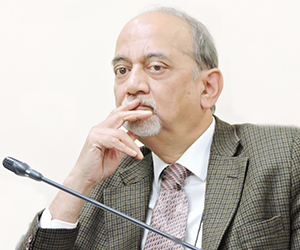President Trump announced on December 20 his decision to withdraw 2,000 US troops from Syria. He justified the decision on the ground that the Islamic State of Iraq & Syria (ISIS) has been defeated. Same time, the UN Security Council adopted Resolution 2451 on December 21 calling for cease-fire in Hodeida, Yemen. Though the two developments are not linked, they could add to the perception that Iranian influence in the region would increase. Trump also decided to reduce US troops in Afghanistan by half from the current level of 14,000. This last would have immediate reverberations in the Af-Pak region.
Middle East has a complex history shaped by many players over decades. Continuation of 2,000 US troops in Syria could not have changed the situation or mitigated its consequences. But the stated reason for US withdrawal, and its timing, has caused consternation amongst US allies. John Bolton, President Trump’s National Security Advisor had stated in September that American forces would remain in Syria “as long as Iranian troops are outside Iranian borders”i. Changing the rationale to defeat of ISIS could convey a different meaning.
President Trump’s announcement was preceded by a statement by President Erdogan that Turkey could take military action against Kurdish forces in eastern Iraq, where US troops are deployed. The Turkish President said on December 12, “We are determined to turn the east of the Euphrates into a peaceful and livable place for its true owners.”ii US withdrawal could leave the ground open for Turkish action against Kurdish Democratic Union Party (PYD), who were used by the US to fight the ISIS.
There has also been sharpening of rhetoric between Israel and Turkey. PM Netanyahu called Erdogan an anti-Semitic dictator in response to the latter’s comments against Jews in Israel.iii Turkey’s relations with Saudi Arabia were already tense with Erdogan raising the Khashoggi murder case repeatedly. The murder was reprehensible, but Turkish advocacy of human rights is suspicious in Arab eyes with centuries of Turkish occupation and exploitation of Arab lands – this along with Erdogan’s dreams of reviving Ottoman glories. Interestingly, Turkey recently received President Rouhani of Iran. Iran, like Arabs, has even older rivalry with the Ottomans. This is compounded by sectarian divide. They have a common interest in containing Kurdish revival.
US decision to withdraw from Syria was described by President Putin as ‘correct’. Iranian Foreign Ministry spokesman welcomed President Trump’s decision to withdraw American forces from Syria, saying that US military presence was ‘wrong’ from the outset.iv
Yemen
The UN Security Council Resolution 2451 adopted on December 21 has limited scope. The Council ‘insisted’ that all parties fully respect the ceasefire agreed for Hudaydah governorate as well as the commitments to redeploy their forces away from Hudaydah city and two satellite ports. The resolution was based on the agreement reached between the Government of Yemen and leaders of the opposition Houthi movement at the UN backed talks in Sweden. This leaves the future of Yemen government, and a political resolution of the conflict, to be discussed later. As the Chinese statement after the adoption of the resolution stated, “We have taken the first step in a 10,000 mile journey’.v
There was mounting pressure in the US Senate to curtail US support to Saudi intervention in Yemen. In the UN Security Council debate, in a break from traditional collegiality with UK, the US threatened to veto the draft resolution tabled by UK and bring its own resolution instead. Ultimately, the US delegate secured omission of critical references to aerial bombardment by Saudi-UAE coalition forces. The final resolution adopted also omitted reference to the food crisis affecting 20 million Yemenis. In a lengthy Explanation of Vote, the US representative criticized omission of ‘a clear condemnation of the Iranian regime for its role in prolonging this war’vi.
The UN Security has obtained authorization to send an Observer Team for an initial period of 30 days for observing cease-fire verification. The team will also verify withdrawal of the armed forces from Hodeida and its twin satellite ports of Salif and Ras Issa, which are in Houthi hands. This could allow UAE, which controls all other ports of Yemen, a face-saving for withdrawal from the costly intervention. The UAE has become the maritime power guarding the sea-lanes through which much of the oil flows to the Suez Canalvii.
Putting this mechanism in place will not be easy, as the proposal of the UN mediator Griffiths also entails use of satellite imagery to assess the damage done by aerial bombardment of economic infrastructure in the rebel zone since 2015. US is determined to protect Saudi Arabia and UAE. The Saudi anxiety was to preserve the balance of UN Security Council resolution 2216 of 2015, which favoured the Kingdom and the Yemeni government it supports. The latest resolution, while largely confined to cease-fire, appears even handed between the government and the rebel Houthi forces.
Af-Pak region
While most of the attention was focused on President Trump’s announcement of withdrawal from Syria, no less important is his decision to halve the troop strength in Afghanistan from 14,000 to 7,000. The decision does not make clear which elements will be withdrawn. However, coming as it does at a time when US talks with Taliban are in a critical stage, this could convey the wrong message. Taliban are being courted by both Russia and US, who are negotiating with them over the head of duly elected, internationally recognized Afghan government. Taliban on their part have given no commitment to cease violence, accept Afghan Constitution and accept power-sharing in a future set-up, which is yet to be decided. They represent a medieval ideology and Pakistan’s geopolitical interests.
President Ghani has announced the appointment of Amrullah Saleh as Interior Minister and Assadullah Khaled as Defence Minister in the wake of President Trump’s decision to halve the troop strength. Both have served as former heads of the Afghan Intelligence Agency, and are opposed to the Taliban.
President Trump has announced appointment of Patrick Shanahan, as Acting Secretary of Defence starting January 1, 2019. This speeds up transition from General Mattis, who was expected to continue till February. US withdrawal from Syria is based on the premise that ISIS has been defeated. In our region, talks with Taliban are being justified by both Russia and US on the ground that ISIS represents the bigger danger. We need to base our strategy on Indian strength. Afghanistan needs to be supported.
(The author has served in the Middle East and is currently a Senior Fellow in the VIF)
References:
i. The Jerusalem Post, Operation Northern Shield’s Goals – And Trump’s Disservice to Israel, December 23, 2018.
ii. The Jerusalem Post, Biased World? Turks Operating in Syria Judged Differently than Israel, December 23, 2018.
iii. The Jerusalem Post, Netanyahu calls Erdogan an anti-Semitic dictator as war of words heats up.
iv. Tehran Times, Tehran;US military presence ‘wrong’ from the outset, December 22,2018.
v. https://www.un.org
vi. https://usun.state.gov Explanantion of Vote Following the Adoption of UNSC Res 2451 on Yemenj
vii. https://www.lemonde.fr
Image Source: http://i.hurimg.com/i/hdn/75/0x0/5a045ba6c9de3d1a14c7ec98.jpg











Post new comment